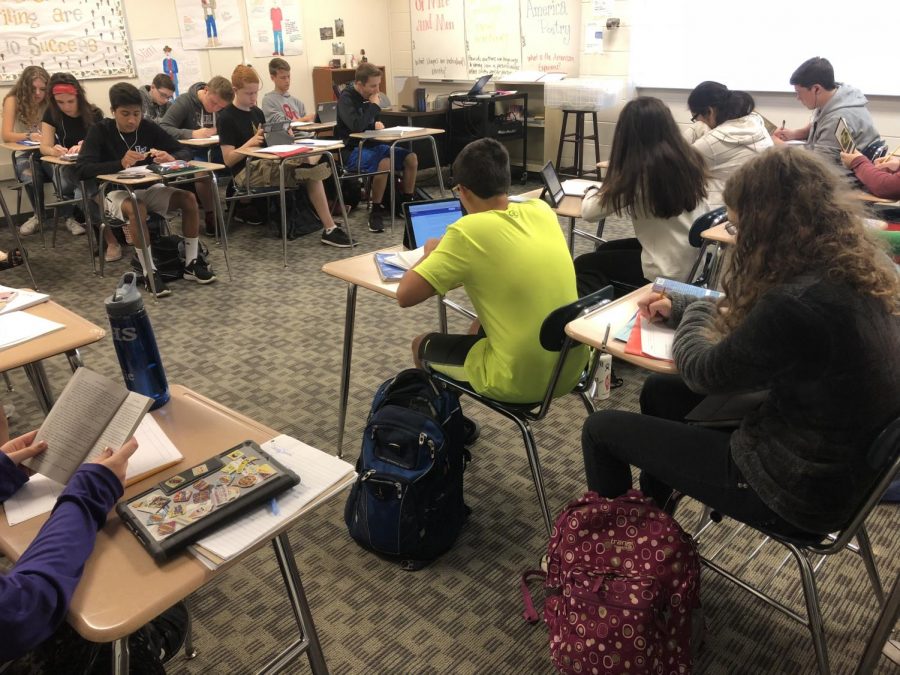Numbers matter
Photo by Photo by Sreellikhi Vangavolu
Class size affects the learning environment, according to Rachael Lee, sophomore. However, Nicole Mironchik, senior, says classes with numerous students acts as a great way for collaboration.
In her first period class she has to fight to have her voice be heard, but in her second class she has to make sure she’s talking loud enough to fill the awkward silence.
With a large variety of different classroom sizes, students feel that something as small as an extra student can benefit or damage their learning atmosphere, according to Rachael Lee, sophomore.
“Large classes are a great way for you to interact with more people, but I think it also can be difficult for the teacher’s relationship with the students. When the teacher has so many students, I have to wonder if they will be able to give us all the same attention and help that we need,” Lee said. “However, big classes are a great way to get more opinions on a topic, as well as different points of view or skills.”
Nicole Mironchik, senior, also questions whether or not classes with more students can really help better a student’s learning experience.
“Just in general, I think large classes are much more fun to be in than smaller classes because there’s lots of energy and ideas going around,” Mironchik said. “[However], I think a lot of students in a class can, in fact, disturb classes because the constant communication with more people is going to be louder and more distracting to a class than a smaller class’ talking would be.”
Although classes with numerous students may encourage group work, classes with fewer students are more socially and emotionally beneficial, according to Molly McDonough, English teacher.
“When there are classes with more students, it is much easier to blend in. From my own experience as a student, when you are in a class that is packed, oftentimes you get lost in a sea of faces. However, smaller classes do not allow for this opportunity of hiding. Even the most reluctant speaker will feel much more inclined to talk when there are fewer people in the room,” McDonough said. “During my teaching career, I can back that statement up because smaller class sizes allow me to hold my students more accountable.”
Similarly, Lee feels that smaller classes act as a phenomenal way to make new friends and get more one on one time with the teacher, in addition to getting more individualized attention.
“Small classes are good because you have a better opportunity to get to know all the other kids in your class, and there aren’t as many people who need to ask for help. [This gives] you more time with your teacher if you need it,” Lee said.
Andrea McKendrick, AP Human Geography and AP Psychology teacher voices her personal opinion on class size.
“In a smaller class I can spend more time with each individual and checking up on them is much easier to do in a smaller class,” McKendrick said.
Along with more time guaranteed with the teacher, smaller classes allow for more time to grasp a new concept or new lesson, according to Mironchik.
“But on a academic note, smaller classes are definitely more beneficial in terms of getting more [of an] explanation and an understanding of that class,” Mironchik, said. “[However], a con of smaller classes is there is fewer collaborative opportunities, and students may not get the different ideas they could’ve gotten from other students in a larger class.”
Although classes with fewer students do have positives when it comes to personalized attention, the lack of people in a class can also create an uncomfortable atmosphere, according to Lee.
“If a class is too small it could get awkward at times, or there may not be enough differing viewpoints and brains to get something thought out [in] a class with more people,” Lee said.
Despite the pros and cons of having more or less students in a class, Lee believes that it is essentially the overall learning experience that matters.
“[Even though] I prefer one class size over another, I think that [success in a class] depends upon an individual, rather than the size of a classroom,” Lee said. “I don’t think I’ll look back and think ‘my math class had a lot of students and that affected my career.’ I’ll just move on.”
###

As a senior, this is Sreelikhi's third year on staff and second year as the Spotlight Editor. She is a member of the Varsity Tennis team, a member of the...

